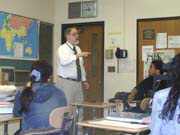With the country in the first stages of war, any discussion of past wars immediately brings history into the present.
At Memorial High School in West New York last week, war and its many facets were brought into focus in a presentation spanning two days made by Memorial teacher Doug Neralich. Neralich is not only an active and involved teacher at Memorial High School, but is a veteran of the Vietnam War, having done a tour as a medic. He recently published a book called Dear Donna: It’s Only 45 Hours from Bien Hoa, a deeply personal recollection of Neralich’s thoughts and experiences while “in country.” The book has been accepted by the West New York Board of Education and by officials at Memorial High School as part of the history curriculum, effectively achieving textbook status. From now on, whenever a history class studies Vietnam, Neralich’s book will be read by the students.
Neralich, who has achieved a measure of local celebrity, relishes his ability to enlighten students to the realities of a long-ago war.
According to history teacher Frank Augustine, the class is particularly timely as the country is involved in an armed conflict. “Absolutely, the war is definitely on the kid’s minds,” said Augustine. “The students are studying Vietnam now and they know what a quagmire that became. They are seeing a possible new quagmire [in Iraq].”
And to emphasize that point, an overheard conversation between two students before the presentation proved that war is on their minds. Said one upon sitting down in his seat, “It’s crazy to think that we’ll be at war so soon. Bush just doomed his presidency.” His classmate responded, “Or cemented it.” Both said there was anti-war sentiment in the school.
Doug Neralich began the slide portion of the presentation by showing snapshots of himself taken as a young soldier in Vietnam. As each slide clicked by, Neralich described, in eloquent terms, what it was like to live in combat conditions. He spoke of the weather in Vietnam. Said Neralich, “Here in the northeast of the United States, we have four distinct seasons. Vietnam has two. Both are extremely hot: one is hot and wet the other is hot and dry. And when I say wet, I mean that it rains everyday for six months straight.”
Neralich went on to describe the horrors of being wet from head to toe all the time. Skin infections and rotting boots were just some of the results.
Neralich also spoke about the “character of the American G.I.” Neralich showed a photo of him suturing the head of a Vietnamese child and stated that while the military did encourage this kind of behavior as part of its “winning the hearts and minds of the people” strategy, many American troops did nice things because they had this special “generous character.” Said Neralich, “Many of you saw this ‘character’ in people on 9/11 and the days following it. That’s how many of the GIs acted while in Vietnam.”
Neralich, in an attempt to get the assembled students to imagine what it must have been like to live in combat situations for years at a time, said, “Think of all the little things we have that we take for granted. A bottle of Coke, which of course is the nectar of the gods, clean water, snacks. When you’re in combat, everything is different; all of that stuff is no longer there. That’s why when you got a ‘care package’ from home, the whole battalion got a care package. It boosted everyone’s spirits.”
When asked by a student if he would do it again, Neralich answered simply that firstly, he was drafted, and secondly, he did what he thought was right. Neralich didn’t describe himself as a war hawk by any stretch of the imagination, but did speak of a long tradition of military service in his family. There was no question of becoming a “conscientious objector” for Neralich. He felt that he was simply doing his duty to his country.
Said Neralich to the students, “Many of you here today are looking at my pictures and thinking about the coming war [and] may think that you wouldn’t go through with it, but you never know what you’re made of.”
In interviews after the presentation, some students expressed concern over the United States’ war stance. Said senior Carlos Villegas, 18, “I thought the presentation was very good. We [students] are definitely thinking about it [the war]. We’re very concerned.” Villegas then showed off a necklace that had a homemade card emblazoned with “War hurts, peace doesn’t.”
Fellow student Mario Blessing, also 18, expressed concerns but had a somewhat different outlook on the prospect of war. Said Blessing, “To tell you the truth, I am extremely scared of being drafted. But if the letter came in the mail, I would go and serve my country. As Mr. Neralich said, you have to do what you feel is right.”
